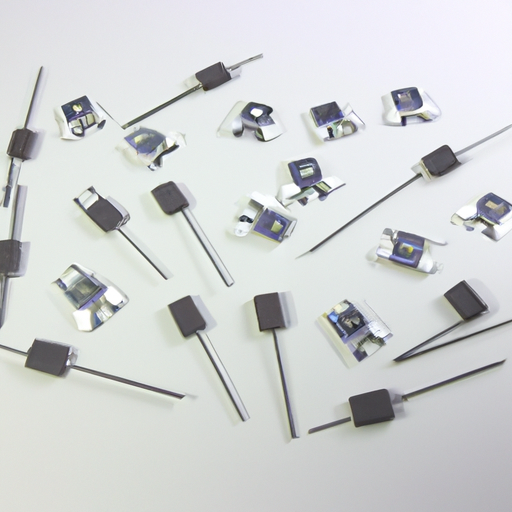Similar Recommendations for Components from Resistor Manufacturers
I. Introduction
Resistors are fundamental components in electronic circuits, playing a crucial role in controlling current flow, dividing voltages, and protecting sensitive components. Their importance cannot be overstated, as they ensure the proper functioning of devices ranging from simple household electronics to complex industrial machinery. This article aims to provide recommendations for similar components from various resistor manufacturers, helping engineers and hobbyists alike make informed decisions when selecting resistors for their projects. Choosing the right components is vital for ensuring reliability and performance, which can significantly impact the overall success of an electronic design.
II. Understanding Resistor Types
Before diving into specific recommendations, it’s essential to understand the different types of resistors available on the market. Each type has unique characteristics that make it suitable for specific applications.
A. Fixed Resistors
1. **Carbon Film Resistors**: These resistors are made by depositing a carbon film on a ceramic substrate. They are known for their low cost and decent performance, making them a popular choice for general-purpose applications.
2. **Metal Film Resistors**: Offering better precision and stability than carbon film resistors, metal film resistors are ideal for applications requiring high accuracy. They have lower noise and a better temperature coefficient, making them suitable for sensitive circuits.
3. **Wirewound Resistors**: Constructed by winding a metal wire around a ceramic core, wirewound resistors can handle high power ratings and are often used in power applications. They are less common in low-power circuits due to their size and cost.
B. Variable Resistors
1. **Potentiometers**: These adjustable resistors allow users to change resistance values manually. They are commonly used in volume controls and other applications where variable resistance is needed.
2. **Rheostats**: Similar to potentiometers but designed to handle higher currents, rheostats are used in applications like dimmer switches and motor speed controls.
C. Specialty Resistors
1. **Thermistors**: These temperature-sensitive resistors change resistance with temperature variations. They are widely used in temperature sensing and compensation applications.
2. **Photoresistors**: Also known as light-dependent resistors (LDRs), these components change resistance based on light exposure. They are commonly used in light-sensing applications, such as automatic lighting systems.
III. Key Specifications to Consider
When selecting resistors, several key specifications must be considered to ensure optimal performance:
A. Resistance Value
The resistance value, measured in ohms, determines how much current will flow through the resistor. It’s crucial to select a resistor with the correct value for your application.
B. Power Rating
The power rating indicates how much power the resistor can dissipate without overheating. Choosing a resistor with an appropriate power rating is essential to prevent failure.
C. Tolerance
Tolerance refers to the allowable deviation from the specified resistance value. A lower tolerance indicates higher precision, which is critical in applications requiring exact resistance values.
D. Temperature Coefficient
This specification indicates how much the resistance changes with temperature. A low temperature coefficient is desirable for applications where temperature fluctuations are expected.
E. Voltage Rating
The voltage rating indicates the maximum voltage the resistor can handle. Exceeding this rating can lead to resistor failure.
F. Physical Size and Packaging
The physical size and packaging of the resistor can impact its suitability for specific applications, especially in compact electronic designs.
IV. Major Resistor Manufacturers
Several leading manufacturers dominate the resistor market, each offering unique products and specialties. Here’s an overview of some of the most prominent resistor manufacturers:
A. Vishay
Vishay is known for its extensive range of resistors, including precision, power, and specialty resistors. Their products are widely used in various applications, from consumer electronics to industrial systems.
B. Yageo
Yageo specializes in passive components, including a broad selection of resistors. They are recognized for their high-quality products and competitive pricing, making them a popular choice among engineers.
C. Panasonic
Panasonic offers a diverse range of resistors, including metal film and wirewound types. Their focus on innovation and quality has made them a trusted name in the electronics industry.
D. Bourns
Bourns is well-known for its variable resistors, including potentiometers and rheostats. They also offer a range of fixed resistors, making them a versatile choice for various applications.
E. TE Connectivity
TE Connectivity provides a wide array of resistors, including specialty types for demanding applications. Their focus on reliability and performance makes them a preferred choice in critical systems.
V. Recommendations for Similar Components
When selecting resistors, it’s helpful to consider alternatives from different manufacturers. Here are some recommendations for similar components from leading resistor manufacturers:
A. Vishay Resistors
1. **Recommended Alternatives**: For applications requiring precision, consider Vishay’s **Vishay Dale** series of metal film resistors. They offer excellent stability and low noise, making them suitable for audio and precision measurement applications.
2. **Comparison with Competitors**: Compared to Yageo’s metal film resistors, Vishay’s offerings may provide better temperature stability, making them ideal for high-precision applications.
B. Yageo Resistors
1. **Recommended Alternatives**: Yageo’s **RC series** of carbon film resistors is an excellent choice for general-purpose applications. They are cost-effective and widely available.
2. **Comparison with Competitors**: While Vishay offers similar carbon film resistors, Yageo’s products often come at a lower price point, making them attractive for budget-conscious projects.
C. Panasonic Resistors
1. **Recommended Alternatives**: Panasonic’s **ERJ series** of thick film resistors is known for its reliability and performance in various applications, including automotive and industrial.
2. **Comparison with Competitors**: Compared to Bourns’ thick film resistors, Panasonic’s ERJ series may offer better thermal stability, making them suitable for high-temperature environments.
D. Bourns Resistors
1. **Recommended Alternatives**: Bourns’ **POT series** of potentiometers is ideal for applications requiring adjustable resistance, such as volume controls in audio equipment.
2. **Comparison with Competitors**: While TE Connectivity also offers potentiometers, Bourns’ products are often preferred for their durability and smooth operation.
E. TE Connectivity Resistors
1. **Recommended Alternatives**: TE Connectivity’s **R series** of wirewound resistors is perfect for high-power applications, providing excellent heat dissipation.
2. **Comparison with Competitors**: Compared to Vishay’s wirewound resistors, TE Connectivity’s offerings may have a higher power rating, making them suitable for more demanding applications.
VI. Application-Specific Recommendations
Different applications may require specific types of resistors. Here are some recommendations based on common use cases:
A. Consumer Electronics
For consumer electronics, such as televisions and audio equipment, metal film resistors from Vishay or Panasonic are recommended for their precision and low noise.
B. Automotive Applications
In automotive applications, thick film resistors from Panasonic or wirewound resistors from TE Connectivity are ideal due to their reliability and ability to withstand harsh conditions.
C. Industrial Applications
For industrial applications, Bourns’ potentiometers and Vishay’s power resistors are excellent choices, providing durability and performance in demanding environments.
D. Telecommunications
In telecommunications, precision resistors from Yageo or Vishay are recommended for their stability and accuracy, ensuring reliable signal transmission.
VII. Conclusion
Selecting the right resistor components is crucial for the success of any electronic design. By understanding the different types of resistors, key specifications, and the offerings from major manufacturers, engineers can make informed decisions that enhance the reliability and performance of their projects. As technology continues to evolve, staying updated on manufacturer recommendations and emerging trends in resistor technology will be essential for future innovations.
VIII. References
- Vishay: [Vishay Resistor Products](https://www.vishay.com)
- Yageo: [Yageo Resistor Products](https://www.yageo.com)
- Panasonic: [Panasonic Resistor Products](https://www.panasonic.com)
- Bourns: [Bourns Resistor Products](https://www.bourns.com)
- TE Connectivity: [TE Connectivity Resistor Products](https://www.te.com)
This comprehensive guide provides a structured approach to understanding and selecting resistors, ensuring that readers are well-equipped to make informed choices for their electronic projects.
Similar Recommendations for Components from Resistor Manufacturers
I. Introduction
Resistors are fundamental components in electronic circuits, playing a crucial role in controlling current flow, dividing voltages, and protecting sensitive components. Their importance cannot be overstated, as they ensure the proper functioning of devices ranging from simple household electronics to complex industrial machinery. This article aims to provide recommendations for similar components from various resistor manufacturers, helping engineers and hobbyists alike make informed decisions when selecting resistors for their projects. Choosing the right components is vital for ensuring reliability and performance, which can significantly impact the overall success of an electronic design.
II. Understanding Resistor Types
Before diving into specific recommendations, it’s essential to understand the different types of resistors available on the market. Each type has unique characteristics that make it suitable for specific applications.
A. Fixed Resistors
1. **Carbon Film Resistors**: These resistors are made by depositing a carbon film on a ceramic substrate. They are known for their low cost and decent performance, making them a popular choice for general-purpose applications.
2. **Metal Film Resistors**: Offering better precision and stability than carbon film resistors, metal film resistors are ideal for applications requiring high accuracy. They have lower noise and a better temperature coefficient, making them suitable for sensitive circuits.
3. **Wirewound Resistors**: Constructed by winding a metal wire around a ceramic core, wirewound resistors can handle high power ratings and are often used in power applications. They are less common in low-power circuits due to their size and cost.
B. Variable Resistors
1. **Potentiometers**: These adjustable resistors allow users to change resistance values manually. They are commonly used in volume controls and other applications where variable resistance is needed.
2. **Rheostats**: Similar to potentiometers but designed to handle higher currents, rheostats are used in applications like dimmer switches and motor speed controls.
C. Specialty Resistors
1. **Thermistors**: These temperature-sensitive resistors change resistance with temperature variations. They are widely used in temperature sensing and compensation applications.
2. **Photoresistors**: Also known as light-dependent resistors (LDRs), these components change resistance based on light exposure. They are commonly used in light-sensing applications, such as automatic lighting systems.
III. Key Specifications to Consider
When selecting resistors, several key specifications must be considered to ensure optimal performance:
A. Resistance Value
The resistance value, measured in ohms, determines how much current will flow through the resistor. It’s crucial to select a resistor with the correct value for your application.
B. Power Rating
The power rating indicates how much power the resistor can dissipate without overheating. Choosing a resistor with an appropriate power rating is essential to prevent failure.
C. Tolerance
Tolerance refers to the allowable deviation from the specified resistance value. A lower tolerance indicates higher precision, which is critical in applications requiring exact resistance values.
D. Temperature Coefficient
This specification indicates how much the resistance changes with temperature. A low temperature coefficient is desirable for applications where temperature fluctuations are expected.
E. Voltage Rating
The voltage rating indicates the maximum voltage the resistor can handle. Exceeding this rating can lead to resistor failure.
F. Physical Size and Packaging
The physical size and packaging of the resistor can impact its suitability for specific applications, especially in compact electronic designs.
IV. Major Resistor Manufacturers
Several leading manufacturers dominate the resistor market, each offering unique products and specialties. Here’s an overview of some of the most prominent resistor manufacturers:
A. Vishay
Vishay is known for its extensive range of resistors, including precision, power, and specialty resistors. Their products are widely used in various applications, from consumer electronics to industrial systems.
B. Yageo
Yageo specializes in passive components, including a broad selection of resistors. They are recognized for their high-quality products and competitive pricing, making them a popular choice among engineers.
C. Panasonic
Panasonic offers a diverse range of resistors, including metal film and wirewound types. Their focus on innovation and quality has made them a trusted name in the electronics industry.
D. Bourns
Bourns is well-known for its variable resistors, including potentiometers and rheostats. They also offer a range of fixed resistors, making them a versatile choice for various applications.
E. TE Connectivity
TE Connectivity provides a wide array of resistors, including specialty types for demanding applications. Their focus on reliability and performance makes them a preferred choice in critical systems.
V. Recommendations for Similar Components
When selecting resistors, it’s helpful to consider alternatives from different manufacturers. Here are some recommendations for similar components from leading resistor manufacturers:
A. Vishay Resistors
1. **Recommended Alternatives**: For applications requiring precision, consider Vishay’s **Vishay Dale** series of metal film resistors. They offer excellent stability and low noise, making them suitable for audio and precision measurement applications.
2. **Comparison with Competitors**: Compared to Yageo’s metal film resistors, Vishay’s offerings may provide better temperature stability, making them ideal for high-precision applications.
B. Yageo Resistors
1. **Recommended Alternatives**: Yageo’s **RC series** of carbon film resistors is an excellent choice for general-purpose applications. They are cost-effective and widely available.
2. **Comparison with Competitors**: While Vishay offers similar carbon film resistors, Yageo’s products often come at a lower price point, making them attractive for budget-conscious projects.
C. Panasonic Resistors
1. **Recommended Alternatives**: Panasonic’s **ERJ series** of thick film resistors is known for its reliability and performance in various applications, including automotive and industrial.
2. **Comparison with Competitors**: Compared to Bourns’ thick film resistors, Panasonic’s ERJ series may offer better thermal stability, making them suitable for high-temperature environments.
D. Bourns Resistors
1. **Recommended Alternatives**: Bourns’ **POT series** of potentiometers is ideal for applications requiring adjustable resistance, such as volume controls in audio equipment.
2. **Comparison with Competitors**: While TE Connectivity also offers potentiometers, Bourns’ products are often preferred for their durability and smooth operation.
E. TE Connectivity Resistors
1. **Recommended Alternatives**: TE Connectivity’s **R series** of wirewound resistors is perfect for high-power applications, providing excellent heat dissipation.
2. **Comparison with Competitors**: Compared to Vishay’s wirewound resistors, TE Connectivity’s offerings may have a higher power rating, making them suitable for more demanding applications.
VI. Application-Specific Recommendations
Different applications may require specific types of resistors. Here are some recommendations based on common use cases:
A. Consumer Electronics
For consumer electronics, such as televisions and audio equipment, metal film resistors from Vishay or Panasonic are recommended for their precision and low noise.
B. Automotive Applications
In automotive applications, thick film resistors from Panasonic or wirewound resistors from TE Connectivity are ideal due to their reliability and ability to withstand harsh conditions.
C. Industrial Applications
For industrial applications, Bourns’ potentiometers and Vishay’s power resistors are excellent choices, providing durability and performance in demanding environments.
D. Telecommunications
In telecommunications, precision resistors from Yageo or Vishay are recommended for their stability and accuracy, ensuring reliable signal transmission.
VII. Conclusion
Selecting the right resistor components is crucial for the success of any electronic design. By understanding the different types of resistors, key specifications, and the offerings from major manufacturers, engineers can make informed decisions that enhance the reliability and performance of their projects. As technology continues to evolve, staying updated on manufacturer recommendations and emerging trends in resistor technology will be essential for future innovations.
VIII. References
- Vishay: [Vishay Resistor Products](https://www.vishay.com)
- Yageo: [Yageo Resistor Products](https://www.yageo.com)
- Panasonic: [Panasonic Resistor Products](https://www.panasonic.com)
- Bourns: [Bourns Resistor Products](https://www.bourns.com)
- TE Connectivity: [TE Connectivity Resistor Products](https://www.te.com)
This comprehensive guide provides a structured approach to understanding and selecting resistors, ensuring that readers are well-equipped to make informed choices for their electronic projects.













